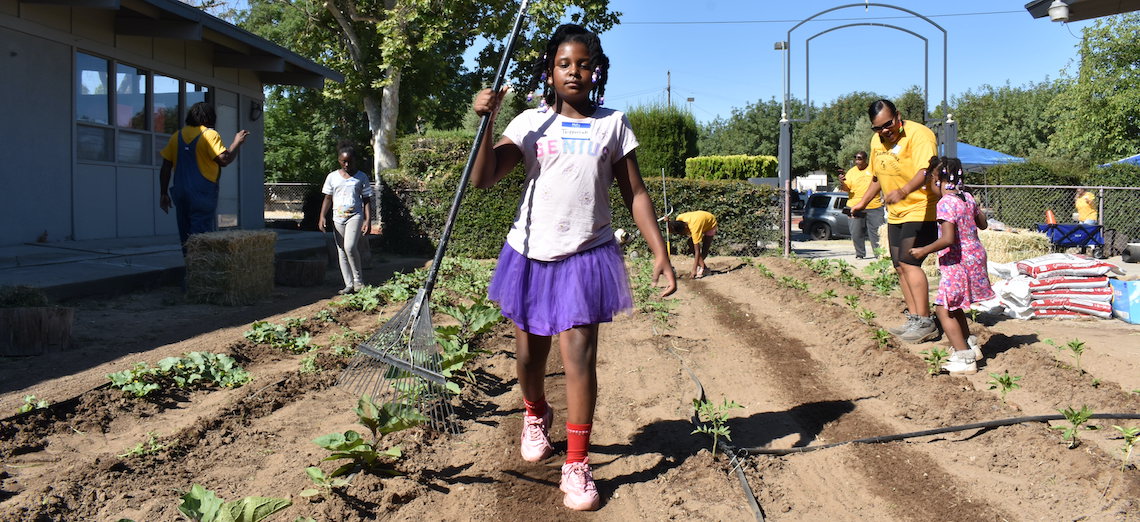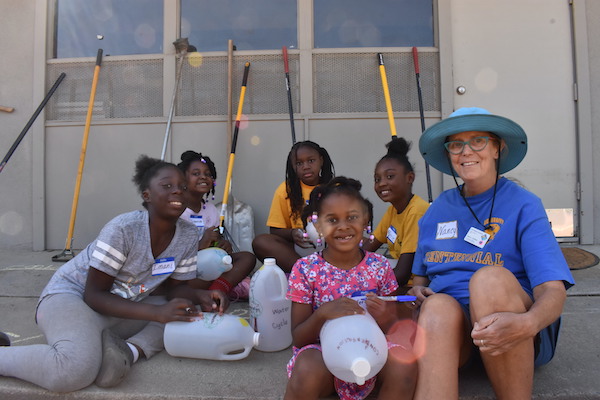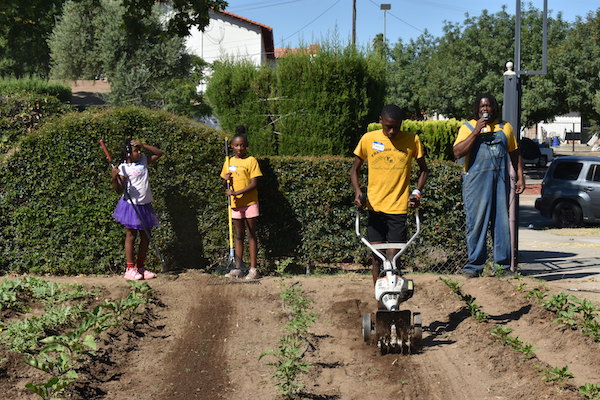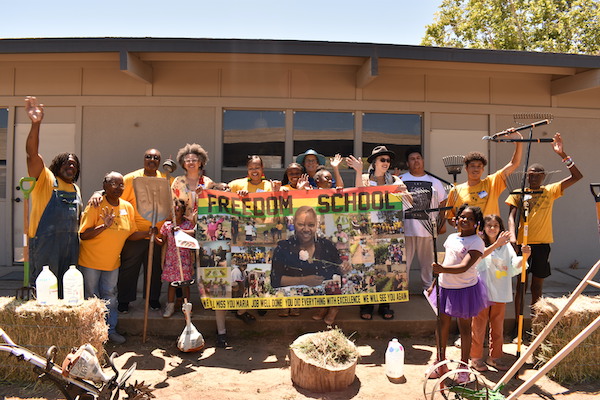
Students participating in the Fresno Freedom School learn about everything from ag science to automotive classes, nutrition and life skills. A young student named Tzipporah walks the rows of her garden with authority — and a rake in hand. Photo by Frank Lopez
Written by Frank Lopez
The future crop of Central Valley farmers is learning to grow food and live off the land at a church garden in Downtown Fresno.
At the Fresno Freedom School, located at the Free Church at 806 Collins Ave., Rev. Floyd D. Harris Jr. is teaching children and teenagers how to grow produce as well as to grow themselves by providing life lessons and guidance.
For about a month during summer vacation, children visit the Freedom School on Saturdays to learn about everything from ag science to automotive classes, nutrition and life skills including personal hygiene, sewing, respect and discipline.
Students grow and tend to the crops including bell peppers, tomatoes and cantaloupes.

They have options on what they want to spend more time learning about, “Hometown Buffet” style, Harris said.
Freedom School is open to children ages 5-18. This year, about 20 students are attending Freedom School.
Growing up on a family farm himself, Harris — with the help of volunteers and board members — started Freedom School about 10 years ago to get the next generation of children interested in agriculture and to help at-risk youth who might not have a positive home environment.
Some of the students are also in the foster care system, Harris said.
The original location was at New Life Church of God in West Fresno, where there was a Freedom School Demonstration Farm — a vegetable farm managed by a group of nearly 40 children and their adult mentors.
Harris “blames” his grandmother for making him so interested in ag and self-reliance, teaching him how to grow food, cook, sew and other life skills.
“I didn’t know at the time as a child that I would be utilizing that today, to teach the next generation that is coming after me the things that the school system doesn’t teach,” Harris said.

Freedom School President Aline Reed joined the board in 2016. She said over the years, children have told her they feel safer at the Freedom School than at their own homes.
Reed said it’s important for children to touch the soil and connect with generations of Black farmers from the past.
As the San Joaquin Valley was being established in the late 1880s, many Black people were recruited from the South to work on farms here.
Harris said the Central Valley used to have many Black farmers, but many were disenfranchised through the practice of redlining, or racial discrimination in housing. They were sold defective seeds purposefully and had to contend with their soil and water being poisoned, he added.
Because of the history of slavery in the U.S., many Black people today see agriculture though that lens, and it keeps them out of the field, Harris said.
Even though that was a real past, it does not have to be the future, Reed said.
Freedom School wants to frame farming and growing your own food with health, self-reliance and connection to nature.
Reed also comes from the background of a family farm. She moved with her parents to Fresno from Texas in 1948 to start a farm.
“We are planting seeds with these kids,” Reed said. “We are planting seeds about responsibility, and integrity, and character and love for yourself and your community.”

Though Freedom School is an African American based group, Reed said anyone is welcome. Freedom School is free for students. The program is made possible through volunteers.
Funding is hard to come by, Reed said, but she feels Freedom School is doing something right because other programs have modeled what they are doing. There have been attempts at grant writing in the past, but it’s a difficult and lengthy process that requires resources.
The Freedom School has been recognized for its efforts, with state Sen. Melissa Hurtado selecting it as the 2021 Non-Profit of the year in the 14th district for its Demonstration Farm at the original location.
Reed said that even though not all the students necessarily want to become farmers, they are interested in jobs in the ag industry.
Reed hopes the school continues to succeed and grow, even without funding.
Harris’s son, Floyd Harris III, recently started working with the U.S. Department of Agriculture’s Natural Resources Conversation Service as a soil conservationist.
His work entails providing conservation planning assistance and knowledge to producers.
Through his father, Floyd was exposed to agriculture, but he didn’t consider getting into the ag sector until he got into college and wanted to branch out with opportunities in ag.
Floyd said he is proud of his father and the work at the Freedom School, seeing the importance of what he is doing for the community.
“Growing up and being mature now, I see that learning these things at such a young age can benefit a child to become more successful than if he didn’t,” Floyd said.








